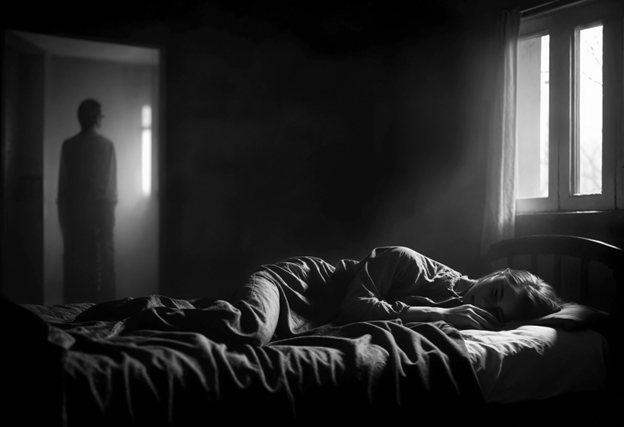Many of us have nightmares that wake us up suddenly at night. These strange dreams stir emotions, leave our hearts racing, or just confuse us. And why do these unsettling nighttime episodes occur? Figuring out what causes them is key to understanding their impact on us.
A significant number of individuals experience a scary dream at some point or another. It’s staggering to think that around 80% face such bad dreams at night, showcasing how common this is across ages and cultures. Whether it’s being pursued endlessly or starting your day rattled by an early morning bad dream’s meaning, these unsettling experiences are deeply woven into the fabric of human sleep.
To grasp the essence of why nightmares arise, we must explore the realm of sleep dreams and the mechanisms behind them. Delving into how these phenomena form in our brains can help us manage, and perhaps lessen, their occurrence or impact. By peeking into the intricate dance of our minds while sleeping, we begin to reveal the curious enigma that nightmares truly are.
Understanding Sleep Stages and Their Role in Dreams
Our nightly rest is split into important stages starting with Non-REM sleep. During those initial hours, we slowly move through light to deeply restful phases, preparing us for the replenishment our bodies need.
Next comes REM sleep, where your brain mimics waking activity. Here, dreams can become bizarre stories unfolding in your mind, often giving rise to intense nightmares. As you sleep, your eyes flicker and your imagination crafts vivid scenes. It’s during these moments that you may experience strange and sometimes scary dreams.
Unveiling the Neuroscience Behind Dreams and Nightmares
The brain creates both our waking and dreaming experiences through its amazing functions.
At the core of emotional dream experiences is a small brain part, the amygdala. The amygdala senses and interprets emotions such as fear or excitement. When we sleep, it becomes very active and causes intense dream emotions. When it gets very active during REM, we might have nightmares with strong feelings.
Linked closely with the amygdala is the hippocampus, which houses memory functions. During REM sleep, this part of the brain works to store your daily experiences. If your day was stressful or tough, those might turn into nighttime dreams or even nightmares. These incidents seep into your dreams because they reflect your waking life.
Dreams are also nudged by neurotransmitters that act as brain’s messengers. Your levels of acetylcholine rise during sleep and stimulate your imagination. Meanwhile, serotonin dips, affecting your mood, leading to bad dream experiences. This shift explains why dreams can be scary during REM sleep phases.
Unraveling Causes and Triggers of Nightmares: Insights from Science
When you feel stressed and anxious, pressure builds in your mind. This stress can turn sleeping into a sequence of disturbing dreams. If anxiety lingers, nightmares can become common, causing sleepless nights.
Sometimes, medicines and health problems can cause nightmares for you. Some drugs change how your brain works during sleep. Talking to a doctor might help reduce these terrible nightmares.
All around the world, people have unique beliefs about nightmares. In the past, nightmares warned about future events or messages from spirits. Now, scientists study these dreams to explain what they really mean.
The Positive Purpose of Nightmares in Emotional Processing
Nightmares can help us work through emotions by highlighting unresolved problems. They give us a space to face our buried fears, helping heal from tough moments in life. These night-time tales can shine light on what we often overlook.
Some say these dreams were once used to train early humans. They acted as practice grounds for honing survival instincts without physical danger. Even now, they might prepare us for real-life fears while keeping us safe.
Though odd dreams may seem scary, they allow us to grow emotionally. By facing fears while asleep, we can handle life’s troubles in real life. Exploring bad dreams is like a nighttime workout for our emotional strength.
Proven Coping Mechanisms and Treatments for Nightmares
Creating a peaceful setting is crucial for a restful sleep. Ensure your room remains calm and at a nice temperature. Keep a good sleep timetable to promote better rest patterns. Stay away from late coffee or heavy night munching.
Stress often leads to unsettling nightmares that wake you up. Try deep breaths or meditation to bring calm. Doing this routine clears the mind, lowering spooky dream chances.
Imagery Rehearsal Therapy (IRT) helps with persistent horrible dreams. This method involves reimagining scary dream scenes with a new ending. Studies show IRT decreases frequent unsettling dream occurrences.



